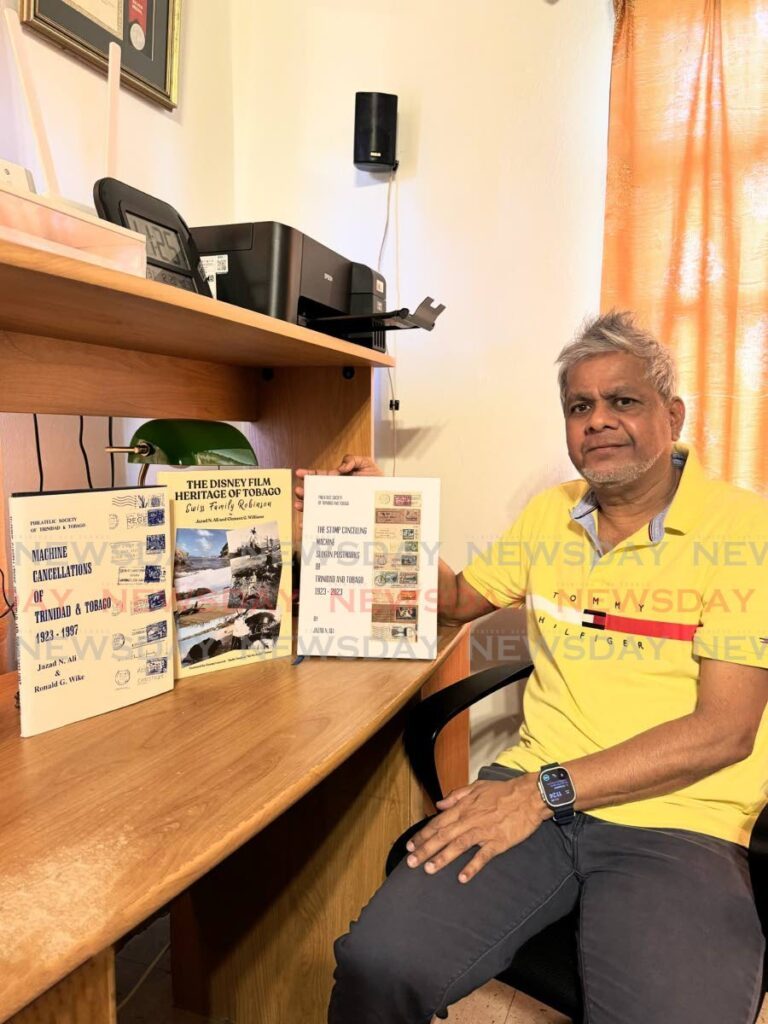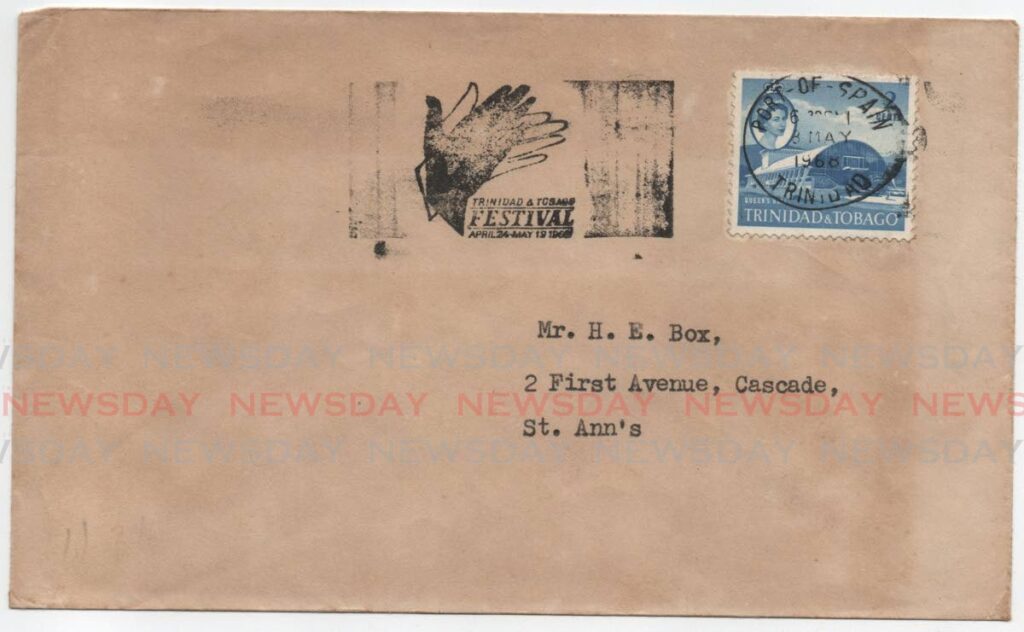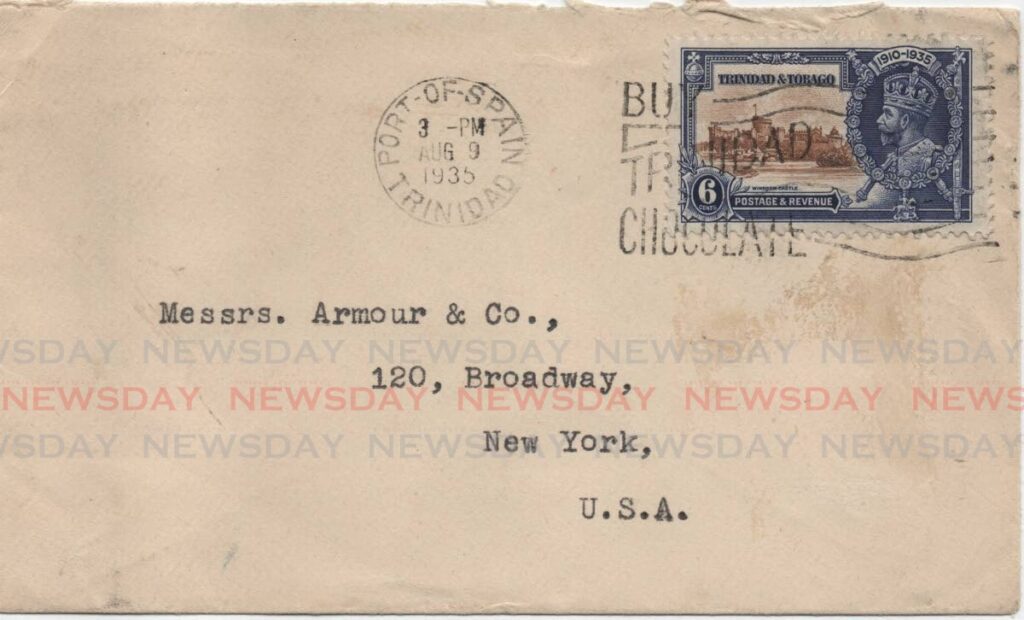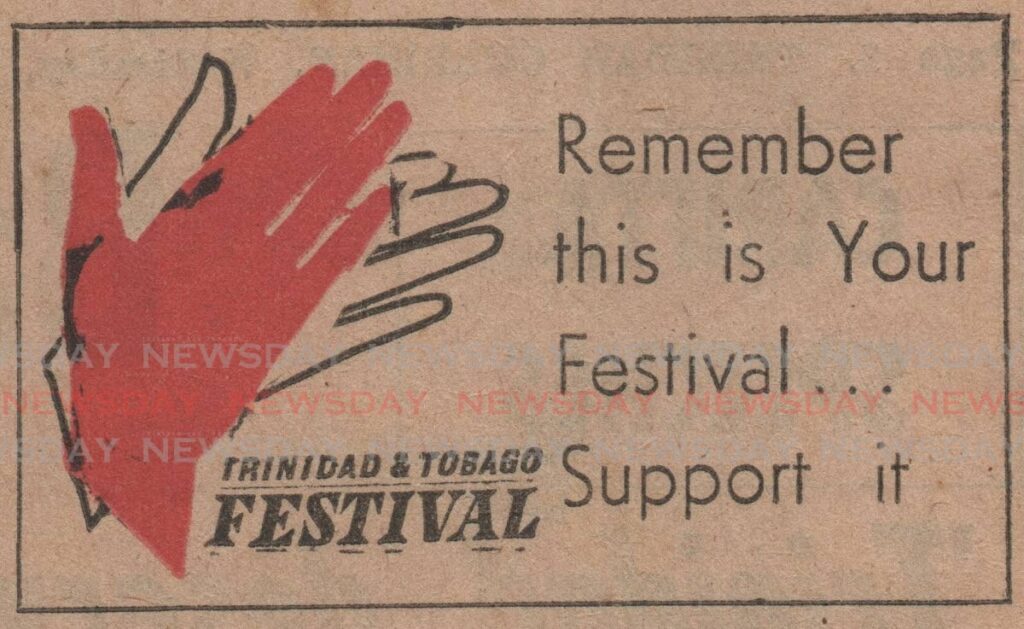Stamps of Success: 2 international medals for Jazad Ali's book

AS a child growing up in the 1970s Jazad N. Ali enjoyed collecting stamps. Fast forward to the present day, and his book chronicling the history of Trinidad and Tobago's stamp cancelling machine slogan postmarks has won him two international medals.
Ali's book, The Stamp Cancelling Machine Slogan Postmarks of Trinidad and Tobago 1923 – 2023, won a large gold medal at the Chicagopex Philatelic show held from November 17-19. Chicagopex is the annual exhibition of the Chicago Philatelic Society, one of the oldest philatelic organisations in the US and has been operating since 1886 (philatelic means the collection and study of postage and imprinted stamps).

The book, released in July, is the latest publication of the Philatelic Society of TT (PSTT) of which Ali is a former vice president and a member since 1982.
Nigel Mohammed, a PSTT member for the past 18 years, was present at Chicagopex when Ali's award was announced. He explained to Newsday via a video call that because he lives in Chicago, he was the "Trinidad liaison" for the book.
He said that philatelic international competitions are held throughout the year and people who write books on the subject can enter. The books are judged based on the content, context and of what is researched.
"(Ali) has researched it for decades by studying thousands and thousands of examples. At Chicagopex, the judges felt like it had a lot of value and was worthy of winning the gold medal."
Mohammed reported this was the first competition the book was entered. The second was the World Stamp Championship Exhibition on December 2 where it won a Large Vermeil award (silver medal).
Ali, speaking to Newsday in a telephone interview, said it felt great to win the large gold medal.
"To be internationally recognised for the work. It is the equivalent of landing on the moon or winning a gold medal in the Olympics."
He said in the Thailand competition the book was judged out of 2,500 exhibits while in the Chicago competition, it was judged out of 3,500 exhibits.
Inspired by Gandhi statue
But what exactly are "stamp cancelling machine slogan postmarks" and what inspired the author to spend more than 25 years researching them?
For those answers, we travel back to the early 1970s and a young Ali growing up in Gasparillo next to the oil refinery.
"Back then most people collected anything and everything without much direction."
He recalled his mother was interested in reading and history and their home always had a lot of reading material. As a child, Ali knew about the British monarchy and he collected British, US and Trinidad stamps.
In 1972 or 1973, when he was in Form One or Two, he had an experience that would forever inspire a passion for local history. At that time his father worked at Texaco and would drop off his sister at Naparima Girls' High School in San Fernando and he would walk with other boys to school at Naparima College. While walking on Harris Promenade an older boy told him the Mahatma Gandhi Memorial statue (erected in 1952) was the first life-sized statue of Gandhi (an iconic Indian anti-colonial politician) outside of India.
"And that resonated with me. I knew about George Washington and Queen Elizabeth II but I didn't know about a statue I was passing every day."
With that spark of inspiration, Ali began researching stamps and postmarks and their backgrounds.
"One thing led to another, and I became an expert on slogan postmarks."
A cancellation is a postal marking applied to a postage stamp to deface and prevent its reuse and would include a date. This process was originally manual but later became automated and then slogans were added to the cancellations. In Britain, it began in 1917 when the British replaced their cancellations of wavy lives on machine-cancelled letters with “Buy War Bonds” which was aimed at boosting government funds during the First World War (British Postmark Society). Trinidad and Tobago's history of stamp cancelling machine slogan postmarks began in June 1923 when it received its first machine. Its first slogan came the following year advertising the first British Empire Exhibition 1924 in Wembley.

"The idea for the British Empire Exhibition was put forward after the First World War. Initially, the large dominions of Australia, Canada, India and South Africa expressed support. However, in 1922, Winston Churchill, then the British Secretary of State for the Colonies, set up a committee to organise participation of the colonies from the West Indies and Atlantic regions," Ali explained.
He said slogan cancels were very diverse and included company advertising, promoting philanthropic organisations, anniversary celebrations, public health advice and postal instructions. Some examples include "Buy Trinidad Chocolate" which ran from December 20, 1926 to March 1, 1936, to promote cocoa, Trinidad's main agricultural crop; "Grow More Food Dig For Victory" which ran from July 17, 1940 to October 1941, whereby the British empire promoted agriculture in the colonies as it struggled with food shortages during World War II; and an advertisement for the Trinidad and Tobago Festival, an arts and culture festival to attract tourists, from April 24-May 19, 1968. Ali said these three are a sample of more than 100 slogans used to cancel the mail.

The importance of slogan cancels
Asked about his particular interest in slogan cancels, Ali said that when researching stamps there was only so much he could research based on the particular stamp but slogans contained much more.
"Slogans chart the country from colonialism to where we are in control of our destiny."
In 1997 he co-authored the book Machine Cancellations of Trinidad & Tobago 1923-1997 with the late Ronald G Wike with whom he also developed the ALI & WIKE numbering system and rarity scale for slogan postmarks. That publication won five silver medals at International Stamp Shows in the US, Germany, China, Austria and the UK. Prior to Wike's death, Ali promised him he would continue to monitor slogan cancels and write about it.
In 2021, during the pandemic, he also co-authored The Disney Film Heritage of Tobago, Swiss Family Robinson with Clement Williams.
The book documents Disney’s stay on the island of Tobago in the West Indies from March 1959 to January 1960, during the filming of the movie Swiss Family Robinson.
Ali said his third and latest book had been on the back burner for the last 26 years before he completed it. He recalled that he originally had 1,000 pages but had to "chop it down" to 340. He said Wike was an "imaginary co-author" until he weaned him off. The book is dedicated to him.
He recalled with the 1997 book there was a criticism that the printing was "fuzzy" and with the new book he wanted to ensure the printing was "impeccable" and also wanted it to be printed locally. He recalled he had a meeting with Office Authority, which had recently finished printing Machel Montano's biography King of Soca, and they assured him the printing would be good.
"Like Machel, the book is about Trinidad, and it was important it was a locally done book, and locally made, and bound, Total local."
PSTT president John Chay in his message included in the book described it as timely, as it is the centenary year of stamp cancelling machines in TT. and described it as "an expression of the author's total commitment to researching stamp cancelling machines, and of course, slogan postmarks."
He added: "This book is not limited to the philatelic usage of the slogans, but also includes background information on their social history. Many of the slogans relate to nationalism, commerce, and industry as well as civic development. The brief history of each slogan can be of interest not only to philatelic scholars, but to social historians as well as the casual reader who may be happy just to see a 'national lottery ticket' or an old postcard."
The book was submitted for the Royal Philatelic Society of London in March next year and Ali said they hope to make it into the final seven. It is also being submitted to a competition in Romania in April 2024 and at Mare Balticum International Stamp Show in July 2024 in Estonia. Ali said he was not able to attend the exhibitions in Chicago and Thailand as he needed to rest up after working 14 hours a day on the book for 14 months, but he plans to attend the stamp show in Estonia next year.
Asked about his purpose for the book, Ali replied it was about documenting things.
"If we don't document it, it will be lost."
He said copies of the book can be found in the Alma Jordan Library at UWI, St Augustine, at UWI Jamaica, in the Smithsonian and a copy will be included in the National Archives.
The book is available at all of Mohammed's bookstores, Metropolitan Bookstore on Ariapita Avenue, Blue Edition in Tunapuna for $420.



Comments
"Stamps of Success: 2 international medals for Jazad Ali’s book"